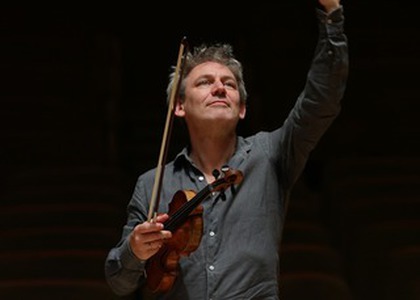> Interviews

Interview with violinist David Grimal
On Wednesday, the 19th of March in 2025, the Radio Chamber Orchestra will perform a new season concert featuring works by Bach, Bartók and Beethoven. On this occasion, David Grimal will return to the Sala Radio, in the dual role of soloist and conductor. We find out more from the French violinist - artist in residence at the ensemble - in a conversation with Ioana Țintea.
You have a deep relationship with the music of Johann Sebastian Bach, whose concertos and sonatas for solo violin you have recorded three times, the last CD released in 2023. How do you relate to this music and how has your approach to it changed over time?
Bach is, in a way, the father of us all. For Western musicians, he set the rules of music. But not only that - as a man and a composer, he embraced all of the humanity. Every time I play his music, it gives me balance and solace in the face of what I see in the world. To answer the second part of your question: he has remained the same, but I have changed. Perhaps it is the passing of the years and the experiences of life that have brought me closer to him.
You have explored Bach's music not only as a soloist but also through the ensemble Les Dissonances, which you founded. In such a vast musical landscape, why do you think this composer's music remains so relevant and what is it that makes you return to this repertoire time and again?
As I said, he is a deep source of musical inspiration. Every time I return to it, I feel like I'm discovering something new, like being reborn. His music heals my heart and soul.
You have built an impressive career both as a soloist and as an educator and initiator of cultural projects such as Les Dissonances and L'Autre Saison, a series of concerts dedicated to the homeless in Paris. What inspired you to start these initiatives?
I worked on L'Autre Saison for 20 years but stopped last year. Now I'm focusing more on "Lumières d'Europe", a project that will take place in Bucharest during the George Enescu Festival in September. It's an academy dedicated to young artists from all over Europe, collaborating with international artists and participating in guest lectures. My current focus is more on passing on knowledge and culture to new generations.
Coming back to the concert at the Sala Radio, you will perform Bach's Concerto in A minor as a soloist, and in Bella Bartók's score and Beethoven's Symphony First, you will be concertmaster and conductor of the ensemble. How does this dual role influence your interpretation of the music?
I have been developing this way of playing with orchestras for more than 20 years, and now I work more and more with professional ensembles. It's a similar process to conducting, but without actually conducting in concert - I play with them. It's a combination of chamber music and conducting, another way of collaborating and sharing music with my colleagues. Basically, during rehearsals I take the role of the conductor so that in the concert we can perform without the conductor, already having a shared vision of the work. This approach involves the musicians more and I think it gives them more freedom of expression, which makes them very happy. It's essentially a collective process. That's how it works.
You play on a 1710 Stradivarius violin, an instrument with a distinctive sound and an impressive history. How does the timbre of the violin contribute to the expressiveness and depth of sound in your interpretation of Bach's score?
I am very lucky and blessed to play this Stradivarius. For over 30 years it has been a true companion, almost an extension of me. We grew up together, or at least I hope so. It is an exceptional instrument and I consider myself very lucky to be able to hold it in my hands.
If you look at Bartók and Beethoven, they were both innovators in their respective eras, always pushing the boundaries of musical language. How do you feel this modernity in your interpretation?
Well, first of all, they were geniuses, like Bach. We can talk about the big three B: Bach Bartók and Beethoven. Of course, each is different, from distinct eras, but what links them is the way they lived their lives: deeply grounded in reality but at the same time connected to the highest aspirations. All of them always sought to go beyond the known horizons, while remaining deeply human. In this context, language becomes secondary - what matters is their inner essence.
You are an artist in residence with the Radio Chamber Orchestra for three seasons. What artistic directions would you like to explore and what projects do you have in mind for this collaboration?
The aim is to constantly raise the artistic level of the ensemble and deepen the repertoire, involving musicians more and more. At the same time, we have invited exceptional artists to collaborate with them in the upcoming season, thus broadening the ensemble's horizons and increasing its visibility in the musical world. I hope this will also allow them to tour Europe with outstanding projects. This is my ambition.
Translated by Miruna Flipache,
University of Bucharest, Faculty of Foreign Languages and Literatures, MTTLC, year II
Corrected by Silvia Petrescu














